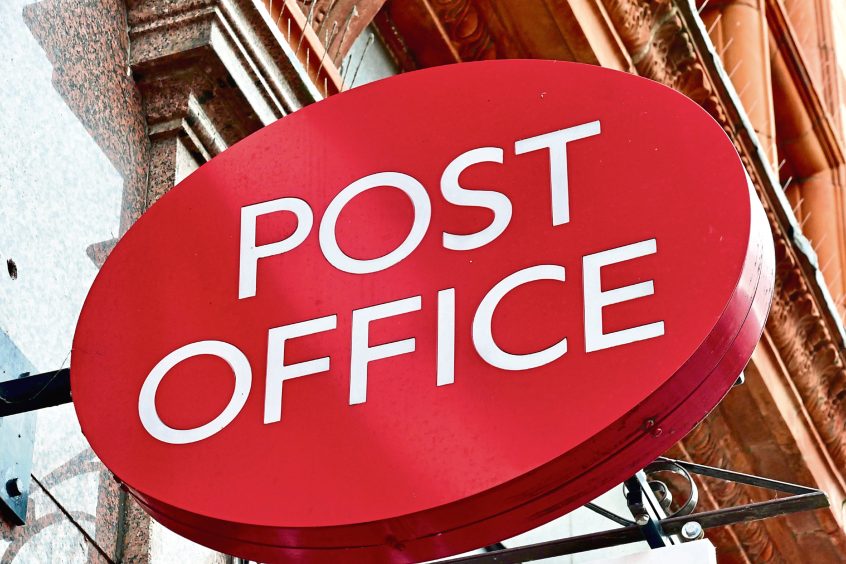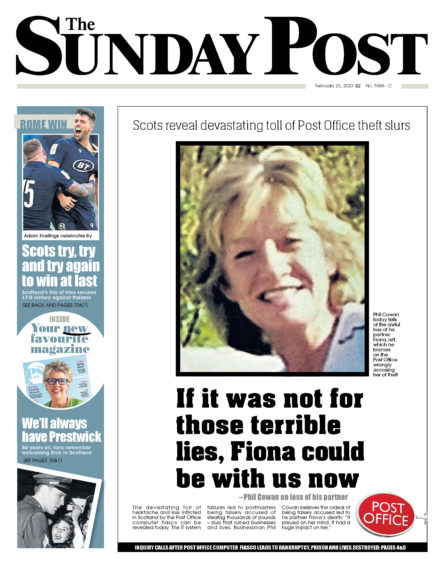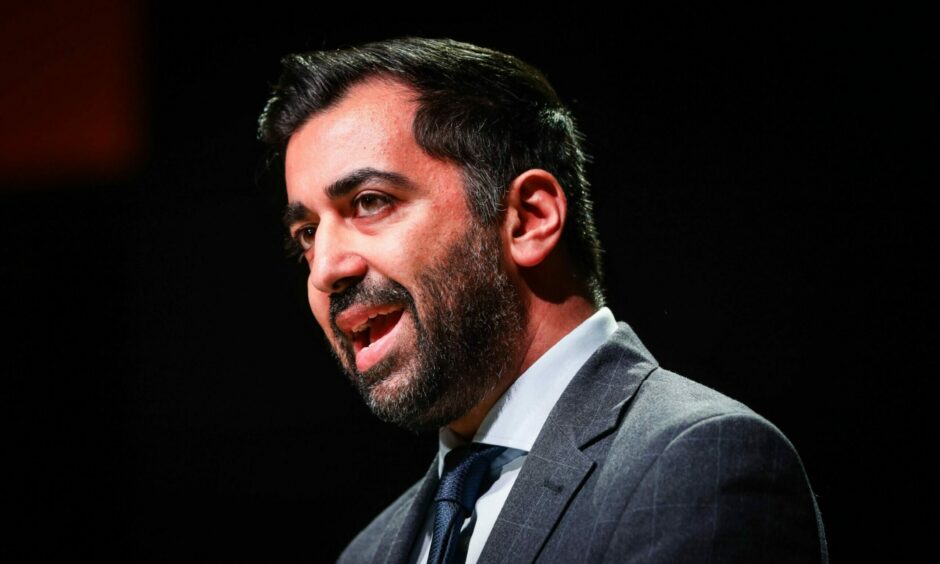
Humza Yousaf’s criticism of the UK Government over the Post Office Horizon scandal has been challenged after one victim claimed his repeated attempts to contact his SNP MP and then-first minister Nicola Sturgeon were ignored.
Former sub-postmaster Phil Cowan, whose partner Fiona McGowan died after being accused of theft and embezzlement by Post Office investigators, first tried to alert his MP to the scandal nine years ago.
Last week Rishi Sunak announced a new law to “swiftly exonerate and compensate” victims of the Horizon scandal, in which a faulty computer system led to 900 sub-postmasters being wrongly convicted of fraud. Some were jailed and many more lost their livelihoods and reputations.
But the UK Government faced criticism for only doing this, despite years of campaigning by victims, after ITV’s drama Mr Bates Vs The Post Office attracted massive public attention.
Among those leading that criticism was Yousaf, who said: “It should not have taken a TV programme for the UK Government to have to act.”
Now Cowan has criticised both Sunak and Yousaf for their lack of action.
‘It riles me that they only take notice after a TV documentary ‘
Cowan and Fiona were running a post office in Parsons Green, Edinburgh, when they were accused of embezzling £30,000. The stress of the investigation and looming court cases sent Fiona, 47, into a deep depression. She died in her sleep in 2009 aged 47, after an accidental overdose of antidepressants and alcohol, leaving two sons, aged 12 and 14.
Cowan wrote to his local MP, Deidre Brock, five times, beginning in 2015. He subsequently also went to Brock’s office, taking a file of correspondence, but claims she was not interested in helping him.
In 2020 he also tried to contact Sturgeon. He said that each time he was given another email to write to, until a final email instructed him to contact her through the first one.
One month after Cowan’s first email to Brock, he told his story to The Sunday Post in February 2020 for an article that featured on our front page.
Despite this, on Friday Yousaf said he was unaware of the growing scandal when he was Justice Secretary between June 2018 and March 2021.
Cowan said: “I contacted Deirdre Brock with around five emails and went along to her office with my file on the Post Office’s accusations of theft and I felt she was not interested,” said Phil Cowan, 70.
“I then wrote to Nicola Sturgeon but never received an answer. At that point I gave up, feeling that no one wanted to believe that the Post Office was falsely accusing sub-postmasters of theft.
“It riles me that the First Minister Humza Yousaf and Prime Minister Rishi Sunak should only take notice when a TV documentary captures the nation.”
Cowan had told how the Horizon system was causing discrepancies, which Fiona had tried to cover with her own money.
Cowan, who now lives in Thailand, said: “Fiona began to cover the false shortfalls with her own money and then when that became impossible, she became distraught.
“Some weeks it was £5,000. Always false shortfalls and never any mistaken excesses in the account.
“I only found out through one of her friends in whom she confided.
He told his area manager, who arrived with two forensic accountants.
He said: “He took me aside and just asked, ‘How soon can you pay us back?’
“The three of them ransacked the place, emptying the office of all that had Post Office ownership – money, stamps, postal orders, alongside the terminals, scales and keys to the safes. We never opened again. They told us we were the only ones this was happening to.
“Eventually, when I sold the shop, I lost £75,000. Worse was to come when Fiona died. It was painful beyond words and I will always be distraught.
“Fiona may well be still alive today if she had not been facing court for false accusations of theft and died before clearing her name.”
“Lessons must be learned from the scandal in the way lessons were learned from Hillsborough.”
Scottish convictions
While the Post Office carries out its own prosecutions in England, in Scotland these were conducted by the Crown and Procurator Fiscal Service, with about 100 postmasters convicted here.
The first convictions were overturned in England in April 2021, when 39 former postmasters were cleared by the Court of Appeal.
At that point the Scottish Criminal Case Review Commission (SCCRC) said it was investigating the convictions of five Scots. It was not until November 2022 that the SCCRC gave six people permission to appeal Horizon convictions. Four have since had their convictions overturned.
On Friday Yousaf was asked why he did not intervene on behalf of Scots sub-postmasters while he was Justice Secretary.
The First Minister claimed he was unaware of the growing scandal during his three years in the role. He claimed there was “no trace of anyone asking me about it” between June 2018 and March 2021.
The Scottish Government said: “Our sympathies go to Mr Cowan for the tragic loss of his wife.
“We are clear that the Post Office Horizon scandal requires urgent action to ensure those wrongly convicted can finally access justice. However, the operation of the Post Office is reserved to the UK Government. The correspondence sent related to the need for the UK Government to launch a public inquiry into the activities of the Post Office and engagement with MPs. Such an inquiry could only be established by the UK Government and, as such, the subject was not within the responsibilities of the Scottish Government.”
The SNP said: “Our deepest sympathies are with Mr Cowan for the loss of his wife and the devastating impact that the post office scandal has had on his family.
“The Post Office is wholly controlled by Westminster and accountable to UK Government ministers. SNP MPs have spent more than a decade fighting for justice for sub-postmistresses, sub-postmasters and their families – including, leading the campaign for a public inquiry, proper compensation, justice and support for all those impacted by this appalling scandal.
“Deidre Brock MP has been at the forefront of campaigning and has offered Mr Cowan an urgent meeting to discuss the matter and provide her support.”
‘Crown Office has questions to answer’
The lawyer who represented the first Scottish sub-postmistress to have her Horizon conviction overturned has identified a number of key questions that the Crown Office must now address.
Stuart Munro handled the case of Susan Sinclair, a Peterhead sub-postmistress whose 2004 conviction for embezzlement from the Post Office was overturned last September.
Around 100 Post Office managers are thought to have been prosecuted in Scotland as a result of faults in the Horizon system.
While the Post Office carried out its own prosecutions in England, these were carried by the Crown Office and Prosecution Service in Scotland.
Prosecutors were told of issues with evidence in 2013, but did not stop pursuing cases until 2015.
Lord Advocate Dorothy Bain KC could be called to Holyrood to explain why concerns were not disclosed sooner.
 Writing in Scottish Legal News last week, Munro, managing director of law firm Livingstone Brown and an expert in white-collar crime, said: “The procurator fiscal has a legal duty to disclose relevant information to those accused of crimes, and that duty continues even after a trial is concluded. As soon as the Fiscal became aware of concerns about the reliability of Horizon, that should have been disclosed. Yet it took until 2023 for the first Scottish convictions to be overturned, many years later.”
Writing in Scottish Legal News last week, Munro, managing director of law firm Livingstone Brown and an expert in white-collar crime, said: “The procurator fiscal has a legal duty to disclose relevant information to those accused of crimes, and that duty continues even after a trial is concluded. As soon as the Fiscal became aware of concerns about the reliability of Horizon, that should have been disclosed. Yet it took until 2023 for the first Scottish convictions to be overturned, many years later.”
Munro also questioned why the Crown Office had not had a proper overview of all such cases – and, thus, possibly become aware of concerns about Horizon.
He said: “Sub-postmasters were told by investigators that nobody else had raised concerns about the reliability of Horizon. That wasn’t true. In Scotland, the fact that all such prosecutions were taken, and overseen, by the independent public prosecutor should have made this clear. Had it been, the concerns of sub-postmasters would have carried more credibility, and proper investigations could have taken place at a much earlier stage.
He also raised the issue of corroboration and questioned why convictions occurred when the only evidence of financial loss appeared to be the Horizon computers.
He said: “Scots law requires criminal cases to be corroborated – that is, evidence of guilt has to come from more than one source. Horizon cases typically involved charges of embezzlement. Yet the only source of evidence that money had disappeared was Horizon. Why did the corroboration rule not act as a safeguard to those wrongly accused?”
Munro believes the Horizon scandal should teach us to judge computer evidence in context. He said: “Lessons must be learned from the way people were convicted in the Post Office Horizon scandal and from how communities were so quick to judge those involved.”
Post Office could be hit with £100m bill over ‘unlawful’ payments claim
The Post Office could be facing a £100 million bill and insolvency after claiming tax relief for its compensation payments to sub-postmasters, according to a tax expert.
Dan Neidle, the head of non-profit organisation Tax Policy Associates, said the Post Office claimed £934m tax relief for its compensation payments, and suggested this could be “unlawful”.
As first reported by the Financial Times, Neidle said the Post Office has treated the compensation it pays to postmasters as tax deductible, which is “not correct”, adding “you only get a tax deduction for payments made ‘wholly and exclusively’ for the purposes of the trade”.
Other tax experts told the FT it was not clear cut, with one saying a business “can generally claim tax deductions for expenses incurred that are closely connected with its trade, even if it is a compensation payment”.
The Post Office said its disclosed information on taxation was “appropriate and accurate”.
Neidle posted on X, saying: “The Post Office claimed £934m tax relief for its compensation payments to the postmasters it persecuted. That’s outrageous. It’s also unlawful – so the Post Office now faces an unexpected £100m tax bill. It may be insolvent.”
A Post Office spokesperson said: “The disclosed information on taxation in Post Office’s Annual Report and Accounts for 2022/23, published on December 20 2023, is appropriate and accurate.

Enjoy the convenience of having The Sunday Post delivered as a digital ePaper straight to your smartphone, tablet or computer.
Subscribe for only £5.49 a month and enjoy all the benefits of the printed paper as a digital replica.
Subscribe
 © Mhairi Edwards
© Mhairi Edwards